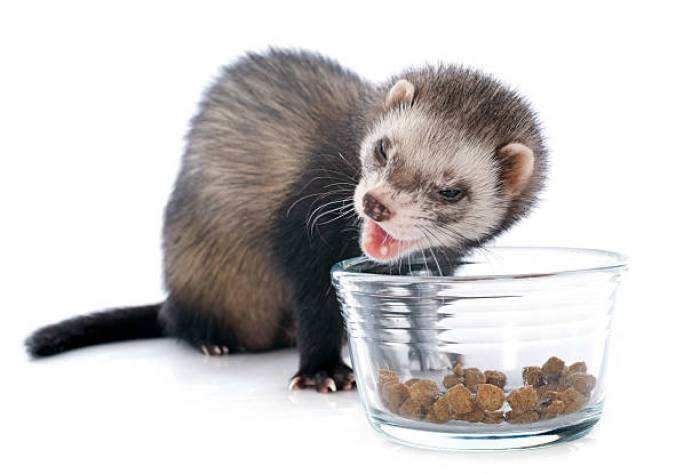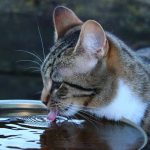Ferrets are our funny little friends.
They’re like a strange but cute combination of cats and snakes.
They’re highly affectionate, and as ferret owners, we want to try to make sure they’re as healthy and happy as they possibly can be.
Many new ferret owners have questions, and many of them deal with feeding.
One will wonder if a ferret can go without food for a day or two.
It might be that you have run out of food, that you need to go away for the weekend, that your ferret is sick and not eating, or that they have escaped into the wild.

And that’s why I wanted to write this article.
Our furry friends, just like us, need food and water to survive.
But their bodies work a little bit differently from ours; their metabolisms are quicker and therefore need to eat more often.
In this article, we’ll be looking at how long a ferret would be able to survive without food or water.
Why It Might Matter
Now, let me clear about one thing, the purpose of this article is not for those of you who are wondering what the minimum you can get away with is.
This article has been written for those whose ferrets are refusing to eat and are feeling worried.
While there are a large variety of reasons why any animal might refuse to eat, I’m no vet, and therefore will not be diagnosing any ferrets with anything today.
If you’re worried about that, you should talk to your vet.
If your ferret is refusing to eat, you will likely be concerned about the health of them and wondering how long until they need to eat because their life depends on it.
Why Food is Needed
All animals (including humans and ferrets) need to eat food to survive. Without food, we die of starvation.
But why is this? Have you ever heard the phrase “you are what you eat”. Well, that’s true. Literally.
The nutrients we get from food are used to repair our cells and create new cells.
And the energy we get from food is used to make our heartbeat and our other organs to carry out their functions.
If you take this energy and these nutrients away, our cells will not be able to repair, and our hearts will not be able to beat.
Why Water is Needed
As with food, water is also needed for our survival (in both humans and ferrets).
Our cells are made up of 70% water.
If there is a lack of water in the body, our cells will be unable to carry out their function.
For this reason, both us and our ferrets must be getting enough water.
A lack of water will cause our cells to stop reproducing and eventually lead to death.
Water is in Food
After reading that, don’t panic.
You don’t need to down 12 pints of water a day.
Most of the water we consume is in the food that we eat.
The same applies to ferrets.
Ferrets are carnivores, because of this, they will eat a lot of meat.
They, like dogs and cats, are unable to digest plant stuff.
Ferrets need a high-protein diet and should consume a wide range of foods.
According to the American Society for the Prevention of Cruelty to Animals, ferrets need around 20% protein in their meals (ASPCA).
Therefore, ferrets’ health might be harmed by a diet that is either rich or too deficient in protein.
And because cells are 70% water, a percentage of their required water will come from the cells of the animals they eat.
You should still make sure that fresh water is always available for them and be extra pushy about making sure they drink it if the food they eat is dried.
Fast Metabolism
So far, we’ve spoken a lot about the similarities between humans and ferrets.
However, we are different animals, and therefore some of our biological functions are different.
One of them is that our metabolism is much slower than theirs.
Metabolism is the speed at which your body processes the food it eats.
A fast metabolism means that you need to eat more often as your body is rapid to give the nutrients of your food to your cells.
Their fast metabolism is the key reason why ferrets are so skinny.
The nutrients get used so quickly.
They aren’t stored in the body as fat.
To Be Healthy
Because they have such a high metabolism, they should be eating every four hours.
This is only a rough guideline, and so if your ferret is leaving his dinner for an extra 30 minutes, it won’t be anything to panic about.
However, if your ferret is regularly waiting for significantly more than 4 hours between meals, it will affect their mood, health, and behavior.
Necessarily, as with humans, ferrets can get ‘hangry’.
Also, as with humans, ferrets won’t go straight into the dying of starvation.
They will first become more tired, more irritable, and more susceptible to becoming sick.
To Be Alive
Different ferrets have different rates of metabolism, even if all of them are faster than yours.
Weaker ferrets such as newborns, elderly, or those with pre-existing conditions, could starve to death within 24 hours.
These ferrets are the most essential for making sure they’re eating regularly.
Stronger, healthier ferrets could, in theory, survive for up to 3 days without eating any food.
And please note that I say, ‘up to’. Your ferret might only be able to survive just over one or two days.
But if your ferret is refusing to eat, you should contact your vet long before it gets to that stage.
The Importance of Water
As well as food, your ferret will also need water.
This is why you need to ensure that fresh water is always available for them when they feel thirsty.
A lack of water will cause the cell repair to slow down and the immune system to become weakened.
A ferret that is not drinking enough water is going to be far more likely to get sick, and the same applies to people.
Topping up their water should be done more often if you’re feeding them dry food.
How Long Can a Ferret Survive Without Food or Water? – Conclusion
If your ferret is refusing to eat, you might get worried and be curious how long they will have left if they continue.
All animals need food because the nutrients in there are what our cells are made of. We also need water for the same reason.
Compared to humans, ferrets have an incredibly fast metabolism, and to be healthy and happy, they will need to be eating, on average, every four hours.
If they don’t eat, they could be dead within 1-3 days. However, you must remember the factors mentioned above.
While ferrets can, in theory, survive up to 3 days without eating, they should be eating every 4 hours.

Purrfect n’ Pawesome is the brainchild of Amanda, who has been into researching and writing about pets to help other pet parents in nurturing their adorable pets. Currently, she runs Purrfect n’ Pawesome along with her team of experienced and dedicated pet experts. Along with being an awesome writer and entrepreneur, Amanda is a cat mom to two innocently spoiled cats, Balanca and Scruffy.
She has been writing about pet care and nurturing and wants to share her readers’ experiences, learnings, and knowledge.
Over the years, she had the opportunity to work with various pet owners having multiple breeds, and that exposure gave her experience and the lessons of a lifetime.
Her family, her entire universe revolves around her two cats, who give her endless support and inspiration to move ahead with her objectives in life. Amanda is a live example of a balanced approach to all parenthood questions we all face in life.






